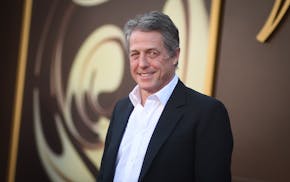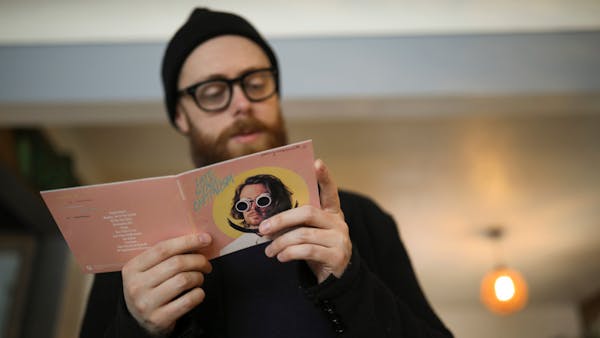The credentials on John Maus probably belie his whereabouts. He's an innovative synthesizer/electronic musician, has a record deal with the label behind Franz Ferdinand and Animal Collective, is playing the Coachella festival (April 13-22) and has earned rave write-ups from NPR, Pitchfork and other trendsetter music blogs.
So if we tell you he calls Austin home, you might assume we mean the cool music mecca of Austin, Texas.
Nope, we're talking Austin, Minn., home of Spam, twang-rock darlings the Gear Daddies and a whole lotta cornfields.
Described by Spin as an "iconoclastic lo-fi musician [who] brings an ecstatic energy to everything he touches," Maus sounded more pragmatic than he did ecstatic when asked about the small southern Minnesota city where he grew up.
"I thought I would come back and enjoy the rural peace of mind," the 37-year-old music wizard explained two weeks ago, talking by phone from his home on the outskirts of Austin. "I'm just on the edge of town where the cornfields start."
That relatively isolated and — more important — affordable home base afforded Maus the opportunity to pursue other interests besides making records and playing shows for the past four years, including earning a Ph.D. in political theory and tinkering like a mad scientist trying to invent new electronic music gear.
His new album for Domino Records, "Screen Memories," is his first in six years. Thursday's concert at the Cedar Cultural Center will also be his first here since 2011 — also his first in town with a full live band, and only his second Twin Cities gig ever.
"Minnesota hasn't really claimed me, but maybe I also haven't done enough to claim Minnesota," he said.
Maus got his start as a professional musician in the mid-2000s after earning an undergraduate degree from the California Institute of Art, where he became fast friends with Ariel Pink and other experimental Los Angeles area musicians. He described those years as a "radical encounter with much more diverse and vanguard people who grew up in coastal metropolises.
"I was exposed to the kind of stuff small-town America never could've prepared me for," he said.
His first three albums boasted an unconventional mix of sometimes eerie, sometimes heavenly waves of synthesizers, jagged New Wave and post-punk dance grooves and deeply conceptual and/or darkly humorous lyrics, equal parts "Doctor Who," "Dr. Strangelove," PiL and O.M.D.
Amid all his favorable reviews, Maus would often bristle at write-ups that called his music retro or nostalgic for the '80s. That's one reason he spent almost two years holed up in Austin trying to build his own modular synthesizers and craft other new electronic music gear.
A truly new wave
"In my mind, I would be able to forge new ground, and have more abilities to make music like the pioneers of this music made it, with new rules," he explained of his experiments.
More specifically, he said he "wanted to control and trigger volt pitch using a modern-day superfast computer" and "open up some kind of new universal tone color," among other things.
Alas, the experimentation did not pay off the way he wanted. Some of his augmented gear was used in the making of "Screen Memories," but for the most part, he acknowledged that the music isn't as radically different as he intended it. (Relatively speaking, though, the dude is still working pretty far out of the box.)
"I simply ran out of time," Maus said. "I still think there's some kind of new universe. I don't know what it is, but hopefully I'll find it if I keep messing with this stuff."
He's trying new things on tour anyway, using a full band instead of singing in front of a laptop like on prior outings. His group includes Twin Cities keyboardist Luke Darger and Austin-based drummer Jonathan Thompson and bassist Joe Maus, his younger brother.
As was the case before he had a band, Maus eschews the guy-with-a-laptop persona on stage with an intense, physical, wild-eyed delivery that one might expect of a punk-rock bandleader.
That stage dynamic is something he learned being a preteen in Austin in the early-'90s, he said, when bands like Nirvana and Rage Against the Machine were all the rage.
"The music I first had a rapport with was that whole when-punk-broke moment, when musicians could be measured in value by how much or how little their show marked a naked affirmation of insanity," he said. "It's just what I had in my toolbox."
Surprisingly, he also credited that wave of '90s rock for turning him on to synthesizer-led music; he liked it because it was so different.
"There was a long period there where experimenting with synthesizers and the music I gravitated to would've seemed ridiculous," he said. "Compared to all the guitars of the era, synthesizers and electronic music to me seemed like something way more vanguard."
Moving back to Austin, Minn., still may seem like the most radical thing Maus has done, but he actually thinks he fits his setting like a Thinsulate glove.
"On a deeper level, my music sort of makes more sense coming from Minnesota than the Gear Daddies, Hüsker Dü or the Replacements," he said. "I'm convinced on the coldest winter nights, where all you hear is a semi on the highway and wind in the tree lines, there are the sort of harmonies in my music that have that same sort of fidelity."
Chris Riemenschneider • 612-673-4658
@ChrisRstrib

Gallery: AJR performs at Xcel
After 40 years in Park City, Sundance exploring options for 2027 film festival and beyond

An NPR editor who wrote a critical essay on the company has resigned after being suspended

